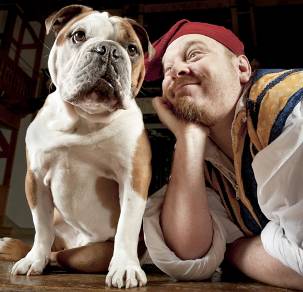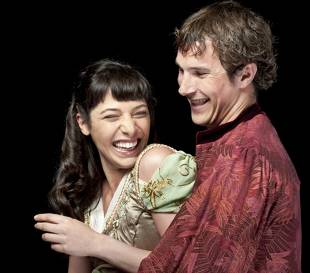Summary 
Authentic indoor production puffs up Shakespeare's rather flimsy romantic comedy with songs about dogs and some shtick as well as liberal doses of virtuoso improv, from live animals onstage to stealing the audience's refreshments to Family Guy and Saturday Night Live wordplay. Certainly entertaining and often clever, if just on the edge of overwhelming the little lightweight script.
Design
Directed by Ralph Alan Cohen. Costume design by Jenny McNee.
Cast
Gregory Jon Phelps (Proteus), Grant Davis (Valentine), Tracie Thomason (Julia), Tracy Hostmyer (Lucetta/Outlaw), Benjamin Curns (Launce), Allison Glenzer (Speed), James Keegan (Antonio/Outlaw), Rene Thornton, Jr. (Panthino/Outlaw), John Harrell (Duke of Milan/Host of the Inn), Abbi Hawk (Silvia), Chris Johnston (Thurio), Ronald Peet (Eglamour).
Analysis
American Shakespeare Center co-founder Ralph Alan Cohen infuses the company's production of The Two Gentlemen of Verona with a slew of pre-curtain songs, most of them about dogs, all played with tongue-in-check seriousness by the cast. First up is "Walking My Dog" then a version of "Your Dog in a Bag" - "friend is a four-letter word" - that features a saxophone solo and an extended horn piece. Even better are the finger-snapping 1950s "Boys Don't Cry" with its nicely appropriate (for this production) lyrics - "I want your girlfriend to be my girlfriend" - and a rocking rendition of Elvis Presley's "Hound Dog." The audience is appropriately appreciative, some already seated onstage and some up in the musicians' box, and pre-show entertainment continues when James Keegan marches onstage in mock outrage, although he is wearing a six-foot-tall Halloween costume of a dog. Keegan feigns indignation that a real dog is being used - "what the hell is that?" - apparently reducing the opportunities for true human theater - "theater, sir!" he harumphs at me, seated in the front row - then "calm yourself, woman!" to a laughing lady in the crowd. But Keegan's appearance serves a purpose beyond light comedy, as he makes it known that all of the dogs used to play "Crab" within The Two Gentlemen of Verona are available to be adopted by interested audience members from Augusta Dog Adoptions, a noble enterprise - far from a gimmick - that lends considerable honor to the entire company.
Cohen begins the production with some schoolboy interaction between Proteus and Valentine, the latter in blue and gold and the former in scarlet and gold, Valentine finally refusing to spar-box with his boyhood friend until they depart with a boy-embrace. Gregory Jon Phelps' pivotal Proteus resists being sent away 1.3, even if it means being reunited with Valentine, because he apparently cannot leave Julia, whose letter of love he has proudly shared with members of the audience. When he finally reunites with Valentine and is introduced to Silvia in 2.3, he is certainly the more reserved and refined of the two, and in soliloquy he covers his mouth with his hands at the horror of his feelings. By 2.6 he admits his feelings have changed: "now I worship a celestial sun."
By contrast, Grant Davis's hero Valentine - a fuzzy heart sewn on his shirt - is a bit daft, failing to notice Silvia's dropped glove 2.1 and running in place like a cartoon in feverish excitement in 2.3 for Proteus to praise Silvia. When he first sees Proteus, Davis's Valentine leaps in place like a hooked fish, then rushes forward, only to stop short and offer an awkward we-are-in-public sideways embrace. Valentine's competition for Silvia's hand is her father's favorite, the amazing technicolor Thurio, who wears yellow and red tights, a purple cap, and a codpiece along with his white handkerchief. Thurio suffers a comic speech impediment - "whord for whord" - with heavy emphasis on "h" sounds as if from an episode of Family Guy: "I know it whell." Spurred to attempting an elopement 3.1 by Proteus, Davis's Valentine wears an oversized black cloak the same fabric as the upstage curtain, so he can conceal his rope ladder and tip-toe like an unseen chameleon villain. He gives Silvia's father a big-eyed mouth-agape stammer straight from a cartoon - "cannot your grace get her to fancy him? huh!" - and his attempt to flee is squelched by Silvia's father simply holding onto one end of the rope.
Traci Thomason's heroine Julia is an attractive blonde in purple and yellow, appealing to the audience with "a woman's reason" in detailing her feelings for Proteus, though she nonchalantly shreds a letter from him 1.2 and flings the torn paper to the air. Moments later she falls face down on the stage to retrieve the scraps, rolling over and kissing the papers until the moment becomes carnal and ends in a sexy whisper: "do what you will!" Thomason's hold over Proteus seems secure 2.2 when she leads him like a trailing puppy dog through the upstage curtain, teasing him until he finally follows from the side of the stage, but her natural suspicion emerges 2.7 when she decides to disguise herself and follow him abroad.

The clowns Speed and Launce of course provide ample comic moments, although certainly no "relief" is needed from the comical romantic entanglements of the main plot. Benjamin Curns and Allison Glenzer have shared this stage within many previous productions, and here their timing and interplay and chemistry are appealing, Glenzer's Speed pushing in a big black shipping trunk as she trades lines with Curns's Launce in a rap-attack speed-speak display. They then share a Saturday Night Live-infused game with the word "truly" replacing the skit show's "really." Glenzer's Speed pretends 2.1 to steal an audience member's purse and seems to delight in ridiculing the doltishly slow Valentine and his love for the sophisticated Silvia, and after a Johnny Cash guitar interlude from the talented John Harrell, singing yet another puppy song - "that dirty egg-sucking dog" - Curns's Launce arrives 2.3 with mutt Emmy on a leash to just about steal the entire show
Curns's improv skills are put to the test by the skittish Emmy, who seems to look balefully at every person in the audience, pausing for frequent glances behind her offstage. Curns struggles vailiantly with the dog - "look you, look you, this way...or not" - leading her in a Keystone Kops chase sequence with Speed 2.5, and his über-serious breaking of bad news to Valentine 3.1 draws the heartiest laugh of the production: "thou art vanished." Curns snaps his fingers and nods knowingly, then launches into a soliloquy on love, frequently confiding to audience members seated onstage, jumping up and down in excitement, and once joined by Speed - "to be slow in words is a woman's only virtue" - enacting a recurring slow-motion side-to-side laughing gimmick with her as if they truly crack each other up.

Cohen's intermission offers little break for the hard-working performers, ten of the twelve remaining onstage to sing "He's a Bad Dog" with the rousing accompaniment of a pair of lead guitars. The Abbi Hawk-led singing of The Chiffons "My Boyfriend's Back" as a 1950s-style finger-wave clap-along - "my boyfriend's back and you're gonna be in trouble" - may be the production's finest moment, an expertly performed song that involves the audience and points out a key element of the play itself. Shakespeare's lightweight play limps into 4.1 with the appearance of the outlaws, wearing black masks and olive green capes, and Cohen fuels the scene with opportunities for improvisation and audience interaction. While one outlaw makes comic threats to an audience member, pointing at her eyes then gesturing "I'm watching you," James Keegan cajoles so many intermission peanuts from people in the first row - sharing them with his fellow outlaws - that he struggles with his dialogue and must apologize: "sorry, I've gotta mouthful." Their assault of Valentine and Silvia derails when they shower the former with so many compliments that Davis's blushing Valentine has to wave them off with an "oh, stop!" gesture. Thurio also provides splashes of broad physical comedy, blowing his nose 3.2 to punctuate the speech of the Duke, singing in a terrible falsetto 4.2 in wooing Silvia, then falling into a snit when he is blocked out by backup singers as Proteus croons a love song. In 4.4 he frets over his physical appearance - "my leg is too long?" - standing downstage to pose and admire himself, showing off a leg for the first few rows of patrons.
After another song about a dog, this time Eglamour crooning 4.3 - "Fido, your leash is too long" - some lyrics causing eruptions of laughter in the audience - "you scare me out of my wits when you do that Shih Tzu" - Cohen propels the production toward its conclusion. Thomason's Julia bemoans her romantic fate to the front row of the audience, holding a framed photograph of her rival Silvia, confessing that she wants to scratch out Silvia's eyes. She observes from just offstage the 5.4 assault on Silvia by her own lover, broken up by a Valentine who seems wounded in spirit: "the private wound is deepest." When Proteus falls to his hands and knees and apologizes, his hands folded in prayer, Davis's Valentine joins him on his knees. Cohen then turns the mood much lighter, allowing Silvia to nod in acceptance of the apology as well. Thomason's Julia, however, faints dead away to the audience's surprise, and once revived by Phelps's Proteus - "Julia?" - the forgiving continues, and the Duke even pardons the outlaws, who pose with their hands on their hips, listening to the details of their "redeeming qualities." The final moments are audience pleasers, a double marriage and a dance, with Julia and Silvia asserting their control over the marriages - and their husbands' roaming hands - as Launce and Speed dance and close out with fast-wiggling jazz hands.